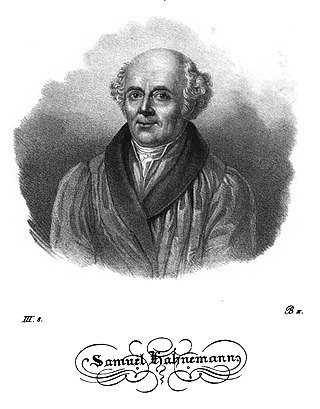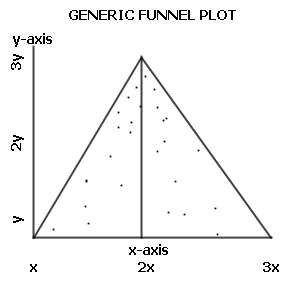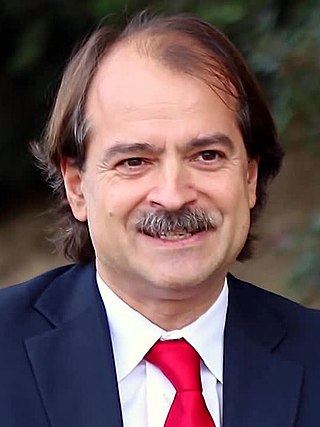Related Research Articles
Alternative medicine is any practice that aims to achieve the healing effects of medicine despite lacking biological plausibility, testability, repeatability or evidence of effectiveness. Unlike modern medicine, which employs the scientific method to test plausible therapies by way of responsible and ethical clinical trials, producing repeatable evidence of either effect or of no effect, alternative therapies reside outside of mainstream medicine and do not originate from using the scientific method, but instead rely on testimonials, anecdotes, religion, tradition, superstition, belief in supernatural "energies", pseudoscience, errors in reasoning, propaganda, fraud, or other unscientific sources. Frequently used terms for relevant practices are New Age medicine, pseudo-medicine, unorthodox medicine, holistic medicine, fringe medicine, and unconventional medicine, with little distinction from quackery.

Homeopathy or homoeopathy is a pseudoscientific system of alternative medicine. It was conceived in 1796 by the German physician Samuel Hahnemann. Its practitioners, called homeopaths or homeopathic physicians, believe that a substance that causes symptoms of a disease in healthy people can cure similar symptoms in sick people; this doctrine is called similia similibus curentur, or "like cures like". Homeopathic preparations are termed remedies and are made using homeopathic dilution. In this process, the selected substance is repeatedly diluted until the final product is chemically indistinguishable from the diluent. Often not even a single molecule of the original substance can be expected to remain in the product. Between each dilution homeopaths may hit and/or shake the product, claiming this makes the diluent "remember" the original substance after its removal. Practitioners claim that such preparations, upon oral intake, can treat or cure disease.

A placebo is a substance or treatment which is designed to have no therapeutic value. Common placebos include inert tablets, inert injections, sham surgery, and other procedures.
In a blind or blinded experiment, information which may influence the participants of the experiment is withheld until after the experiment is complete. Good blinding can reduce or eliminate experimental biases that arise from a participants' expectations, observer's effect on the participants, observer bias, confirmation bias, and other sources. A blind can be imposed on any participant of an experiment, including subjects, researchers, technicians, data analysts, and evaluators. In some cases, while blinding would be useful, it is impossible or unethical. For example, it is not possible to blind a patient to their treatment in a physical therapy intervention. A good clinical protocol ensures that blinding is as effective as possible within ethical and practical constraints.
In published academic research, publication bias occurs when the outcome of an experiment or research study biases the decision to publish or otherwise distribute it. Publishing only results that show a significant finding disturbs the balance of findings in favor of positive results. The study of publication bias is an important topic in metascience.

Ben Michael Goldacre is a British physician, academic and science writer. He is the first Bennett Professor of Evidence-Based Medicine and director of the Bennett Institute for Applied Data Science at the University of Oxford. He is a founder of the AllTrials campaign and OpenTrials, aiming to require open science practices in clinical trials.

The Faculty of Homeopathy was formed in 1944 from the British Homeopathic Society. It was incorporated by the Faculty of Homeopathy Act 1950, which confers an educational function on the Faculty. The Faculty promotes the development of homeopathy.

Organon of the Art of Healing by Samuel Hahnemann, 1810, laid out the doctrine of his ideas of homoeopathy. The work was repeatedly revised by Hahnemann and published in six editions, with the name changed from the second onwards to Organon of Medicine, and has been so since the mid-19th century.
In 1998, the Swiss government began a comprehensive Program for Evaluating Complementary Medicine to study the role and effectiveness of complementary medicine, which was playing an ever-increasing role in the Swiss medical system.
In homeopathy, arsenicum album (Arsenic. alb.) is a solution prepared by diluting aqueous arsenic trioxide generally until there is little amounts of Arsenic remaining in individual doses. It is used by homeopaths to treat a range of symptoms that include digestive disorders and, as an application of the Law of Similars, has been suggested by homeopathy as a treatment for arsenic poisoning. Since the arsenic oxide in a homeopathic preparation is normally non-existent, it is considered generally safe, although cases of arsenic poisoning from poorly prepared homeopathic treatments sold in India have been reported. When properly prepared, however, the extreme dilutions, typically to at least 1 in 1024, or 12C in homeopathic notation, mean that a pill would not contain even a molecule of the original arsenic used. While Anisur Khuda-Bukhsh's unblinded studies have claimed an effect on reducing arsenic toxicity, they do not recommend its large-scale use, and studies of homeopathic remedies have been shown to generally have problems that prevent them from being considered unambiguous evidence. There is no known mechanism for how arsenicum album could remove arsenic from a body, and there is insufficient evidence for it to be considered effective medicine (for any condition) by the scientific community.

A funnel plot is a graph designed to check for the existence of publication bias; funnel plots are commonly used in systematic reviews and meta-analyses. In the absence of publication bias, it assumes that studies with high precision will be plotted near the average, and studies with low precision will be spread evenly on both sides of the average, creating a roughly funnel-shaped distribution. Deviation from this shape can indicate publication bias.
Sir Rory Edwards Collins FMedSci FRS is a British physician who is Professor of Medicine and Epidemiology at the Clinical Trial Service Unit within the University of Oxford, the head of the Nuffield Department of Population Health and a Fellow of Green Templeton College, Oxford. His work has been in the establishment of large-scale epidemiological studies of the causes, prevention and treatment of heart attacks, other vascular disease, and cancer, while also being closely involved in developing approaches to the combination of results from related studies ("meta-analyses"). Since September 2005, he has been the Principal Investigator and Chief Executive of the UK Biobank, a prospective study of 500,000 British people aged 40–69 at recruitment.
Peter Christian Gøtzsche is a Danish physician, medical researcher, and former leader of the Nordic Cochrane Center at Rigshospitalet in Copenhagen, Denmark. He is a co-founder of the Cochrane Collaboration and has written numerous reviews for the organization. His membership in Cochrane was terminated by its Governing Board of Trustees on 25 September 2018. During the COVID-19 pandemic, Gøtzsche was criticised for spreading disinformation about COVID-19 vaccines.
The Jadad scale, sometimes known as Jadad scoring or the Oxford quality scoring system, is a procedure to assess the methodological quality of a clinical trial by objective criteria. It is named after Canadian-Colombian physician Alex Jadad who in 1996 described a system for allocating such trials a score of between zero and five (rigorous). It is the most widely used such assessment in the world, and as of May 2024, its seminal paper has been cited in over 24,500 scientific works.

John P. A. Ioannidis is a Greek-American physician-scientist, writer and Stanford University professor who has made contributions to evidence-based medicine, epidemiology, and clinical research. Ioannidis studies scientific research itself - in other words, meta-research - primarily in clinical medicine and the social sciences.
George Lewith was a professor at the University of Southampton researching alternative medicine and a practitioner of complementary medicine. He was a prominent and sometimes controversial advocate of complementary medicine in the UK.
Klaus Linde is a German physician and alternative medicine researcher. He works at the Centre for Complementary Medicine Research at the Technical University of Munich in Germany.
Chlamydia research is the systematic study of the organisms in the taxonomic group of bacteria Chlamydiota, the diagnostic procedures to treat infections, the disease chlamydia, infections caused by the organisms, the epidemiology of infection and the development of vaccines. The process of research can include the participation of many researchers who work in collaboration from separate organizations, governmental entities and universities.
The Society of Homeopaths (SoH) is a British private limited company formed in 1978 by "a small group of homeopaths who were keen to work together for the development of the profession and to ensure high standards in the practice of homeopathy" and at September 2018 had 997 members on the Society's register who can refer to themselves as RSHoms. The SoH's register was first accredited by the Professional Standards Authority (PSA) in September 2014 allowing members to display the Accredited Register's logo at the time. In January 2021 the PSA suspended the society's accreditation for failure to meet standards the PSA had set.
The infinitesimally low concentration of homeopathic preparations, which often lack even a single molecule of the diluted substance, has been the basis of questions about the effects of the preparations since the 19th century. Modern advocates of homeopathy have proposed a concept of "water memory", according to which water "remembers" the substances mixed in it, and transmits the effect of those substances when consumed. This concept is inconsistent with the current understanding of matter, and water memory has never been demonstrated to exist, in terms of any detectable effect, biological or otherwise.
References
- 1 2 "Matthias Egger". University of Bern. Retrieved 25 May 2015.
- ↑ "Matthias Egger is the new president of the National Research Council of the SNSF". 23 September 2016. Retrieved 4 November 2016.
- ↑ "Election of the new Research Council and handover of the presidency". 9 December 2024. Retrieved 1 January 2025.
- ↑ Egger, M.; Smith, G. D.; Schneider, M.; Minder, C. (13 September 1997). "Bias in meta-analysis detected by a simple, graphical test". BMJ. 315 (7109): 629–634. doi:10.1136/bmj.315.7109.629. PMC 2127453 . PMID 9310563.
- ↑ "Matthias Egger". Google Scholar. Retrieved 15 October 2020.
- ↑ Shang, A; Huwiler-Müntener, K; Nartey, L; Jüni, P; Dörig, S; Sterne, JA; Pewsner, D; Egger, M (August 27, 2005). "Are the clinical effects of homoeopathy placebo effects? Comparative study of placebo-controlled trials of homoeopathy and allopathy". Lancet. 366 (9487): 726–32. doi:10.1016/S0140-6736(05)67177-2. PMID 16125589. S2CID 17939264.
- ↑ WebMD (26 August 2005). "Study: Homeopathy Drugs Don't Work". Fox News. Retrieved 25 May 2015.
- ↑ Smyth, Chris (19 February 2014). "Why healthy people choose to end their lives in a suicide clinic". The Australian. Retrieved 25 May 2015.
- ↑ "Living under a flight path may be bad for the heart: study". Reuters. 10 October 2010. Retrieved 25 May 2015.
- ↑ "Vaccine may not protect against pneumonia". UPI. 6 January 2009. Retrieved 25 May 2015.
- ↑ Who we are Geneva Science and Diplomacy Anticipator (GESDA).